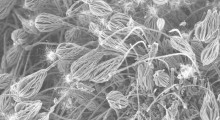Berkeley Lab scientists reveal how nanoscience will bring us cleaner energy, faster computers, and improved medicine.
Alex Weber-Bargioni: How can we see things at the nanoscale? Alex is pioneering new methods that provide unprecedented insight into nanoscale materials and molecular interactions. The goal is to create rules for building nanoscale materials.
Babak Sanii: Nature is an expert at making nanoscale devices such as proteins. Babak is developing ways to see these biological widgets, which could help scientists develop synthetic devices that mimic the best that nature has to offer.
Ting Xu: How are we going to make nanoscale devices? A future in which materials and devices are able to assemble themselves may not be that far down the road. Ting is finding ways to induce a wide range of nanoscopic building blocks to assemble into complex structures.



 Your new post is loading...
Your new post is loading...









